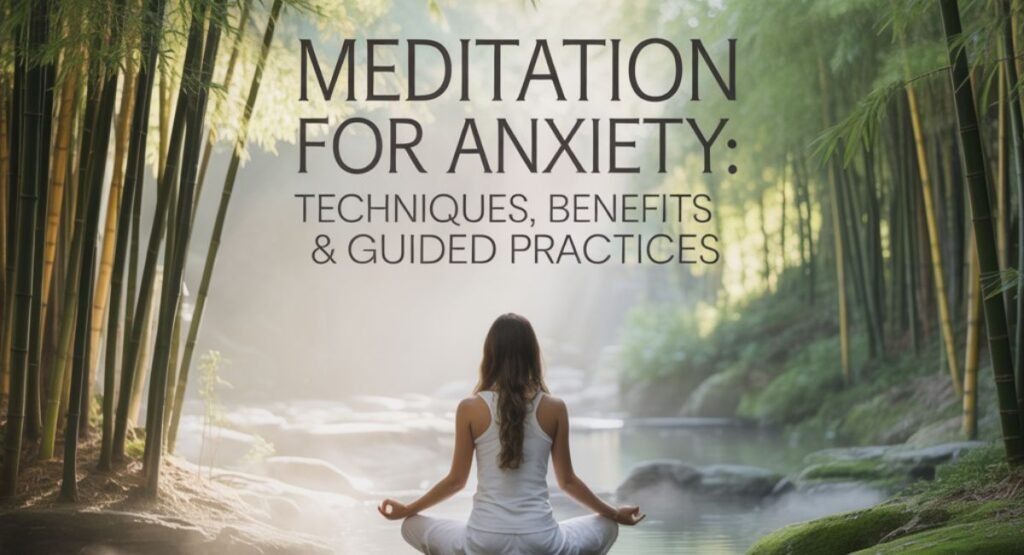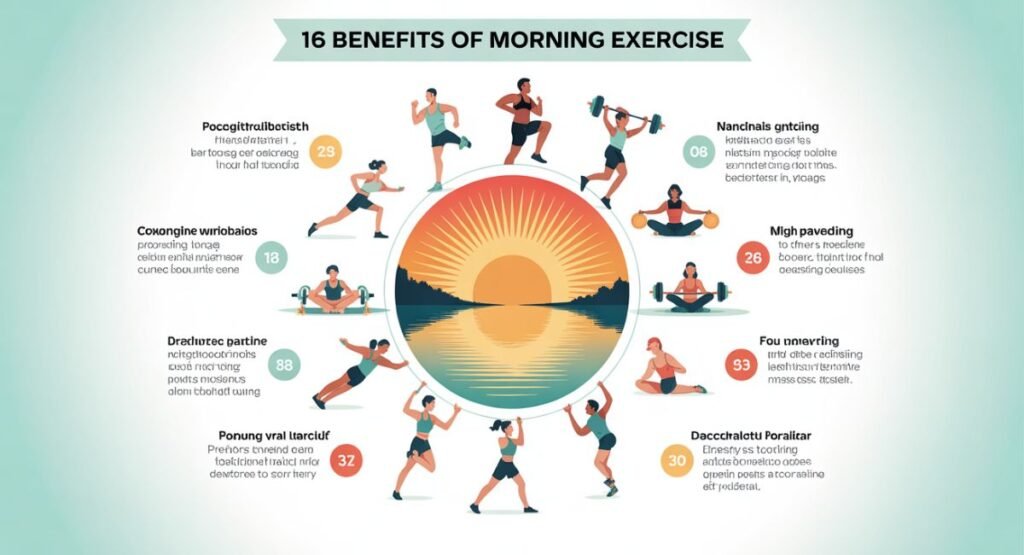Introduction
If your mind often feels like a whirlwind of thoughts, meditation for anxiety might be the calm you need. This ancient practice isn’t just about sitting in silence—it’s a science-backed method to ease your mind and body. Whether you’re new to mindfulness or seeking deeper relief, exploring techniques, proven benefits, and expert-guided practices can help you regain balance. In a world that moves fast, carving out a few minutes for stillness offers powerful results. It strengthens your mind-body connection, promotes emotional well-being, and teaches you how to manage stress naturally. Let’s dive into how meditation becomes your anchor in anxious times.

What Is Meditation & How It Helps with Anxiety
Meditation is a simple yet powerful way to calm the mind. It is one of the most effective natural ways to reduce stress and worry. This practice has been around for thousands of years and is known for creating a strong mind-body connection. When you meditate, you focus on breathing, stillness, or a single thought. This helps reduce mental noise and brings clarity. People often wonder, “What are the benefits of meditation?” One major benefit is its power to ease anxiety.
Meditation for health and healing is now supported by science. Studies show that regular meditation can lower stress, improve focus, and promote emotional well-being. If you’re asking, “Why is meditation good for anxiety?” the answer lies in its ability to bring awareness to the present moment. It helps you stop racing thoughts and find balance. Many doctors now suggest meditation for beginners who struggle with worry or panic.
Proven Benefits of Meditation for Anxiety
Meditation has many health benefits. It can lower blood pressure, reduce stress hormones, and even ease physical pain. People who use stress relief techniques like meditation often feel more calm and focused. These practices improve self-awareness practices and build mental strength over time. You begin to notice your triggers and respond instead of react.
You may ask, “Can meditation improve sleep?” Yes, it can. Meditation helps relax your body and mind before bedtime. A quiet mind means deeper sleep. People using a daily meditation routine for stress often sleep better, wake up refreshed, and feel less anxious. Also, regular meditation improves patience and creativity.
Popular Types of Meditation for Anxiety
There are many kinds of meditation. Each offers unique ways to reach inner peace. The most popular include guided meditation, mindfulness meditation, body scan meditation, and mantra repetition. These types help you slow down and tune into the present moment. If you’re unsure where to start, these are simple meditation steps for beginners.
Mindfulness meditation is especially helpful. It involves paying attention to your breath or thoughts without judgment. Want to know, “How does mindfulness meditation work?” It trains your mind to stay present and let go of anxiety. Techniques like tai chi and yoga also combine gentle movement with breathwork and focus. These are also forms of meditation.
Step-by-Step: How to Start Meditating for Anxiety
Starting meditation doesn’t require much. If you’re wondering, “How to meditate effectively?“ here’s how to begin. Find a quiet space where you can sit comfortably. Your meditation positions don’t have to be perfect. You can sit on a chair or the floor. Just keep your back straight and hands relaxed.
Close your eyes and breathe deeply. This will activate your relaxation techniques. Try focusing on the sensation of air moving in and out. This is called breath awareness. When your mind wanders, bring your attention back to your breath. Do this for five to ten minutes daily and increase with time.

Guided Meditations for Instant Anxiety Relief
Guided meditation is a great way to start. You follow the voice of a teacher who helps you relax. They may ask you to visualize a peaceful place or repeat calming phrases. For those looking for easy ways to practice meditation daily, guided sessions are ideal. Apps like Headspace and Calm offer quick and effective sessions.
If you wonder, “Which meditation helps with anxiety attacks?” try a 5-minute body scan or visualization session. These techniques bring your focus away from panic and into your body. This supports the mind-body connection and teaches you to observe feelings rather than get overwhelmed.
Breathing Exercises That Help with Anxiety
Breathing is key in meditation. Deep breathing exercises send signals to your brain to relax. One simple method is box breathing: inhale for 4 seconds, hold for 4, exhale for 4, and hold again. This cycle activates the parasympathetic system, which calms anxiety.
If you want to know “How to calm your mind instantly,” focus on your breath. It grounds you and stops spiraling thoughts. Practicing breath awareness daily is one of the best stress relief techniques. It’s free, easy, and effective.
Meditation During Panic Attacks: What to Do
During a panic attack, it’s hard to think straight. But meditation can help ground you. First, focus on the breath. Count slowly with each inhale and exhale. If that feels too hard, try labeling objects around you. This keeps your mind busy and present.
Many ask, “Can meditation reduce anxiety and stress?” Yes, especially in moments of high panic. Self-awareness practices teach you to recognize when anxiety builds. Over time, meditation creates space between you and your thoughts. This gives you more control and calmness.
Tips to Build a Daily Meditation Habit
Meditation works best when practiced daily. Start with just 5 minutes each morning. Use the same spot and time to build a habit. You don’t need anything fancy. Use a pillow or chair and keep your phone on silent. Consistency brings the best results.
If you’re wondering, “Meditation without religion—is it possible?” the answer is yes. Meditation can be spiritual, but it doesn’t have to be. You can practice it purely for health and focus. Adding spiritual reflection is optional. Some even practice meditative prayer based on their beliefs.
Final Thoughts: Be Kind to Your Mind
Meditation is not about perfection. It’s about being present. Even when your mind wanders, that’s okay. Gently bring it back. Every time you return to your breath, you’re training your brain. This strengthens your calm response to stress.
If you’re searching for the best meditation types for mental health, try different ones and see what works. Some days you’ll feel focused. Other days, not so much. That’s normal. The key is to be consistent. Over time, meditation helps build a more peaceful life.
FAQs
What are the benefits of meditation for anxiety?
Meditation reduces stress, calms racing thoughts, and improves emotional balance by training the mind to stay present.
Why is guided meditation beneficial?
Guided meditation offers step-by-step support, making it easier to focus, relax, and reduce anxiety even for beginners.
What are the benefits of guided imagery meditation?
Guided imagery promotes deep relaxation, lowers stress hormones, and helps shift your mind away from anxious thoughts.
Which meditation is best for anxiety?
Mindfulness meditation, body scan, and guided breathing are the most effective types for reducing anxiety and restoring calm.




Pingback: Bedtime Routines for Adults: Sleep Better Every Night